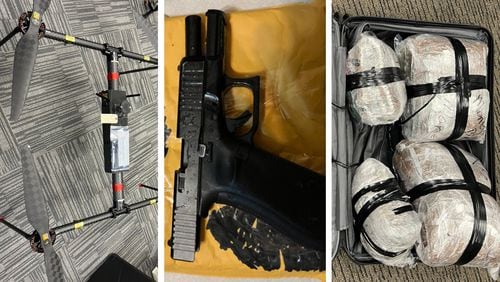Jun Ying sat silently in court Thursday while Magistrate Judge Linda Walker debated the merits of letting him await trial a free man.
The slightly built Ying, the former chief information officer of a sizeable Equifax unit, wore a tieless, blue dress shirt, black, beltless pants and a chain that bound his ankles. He was indicted Tuesday on charges of insider trading for sale of nearly $1 million in stock in the days before the Atlanta-based company announced a massive data breach.
He was in court Thursday for his arraignment at which he pled not guilty.
His lawyer, Joseph Burby, had worked out an agreement with Assistant U.S. Attorney Christopher Huber for Ying to be freed with his Atlanta home serving as the guarantee that he would show up for the trial. Moreover, the signature on that promise would not be given until Tuesday, because Ying’s wife is co-owner and she is out of town.
The judge wasn’t enthusiastic about the deal.
Ying’s ties with China worried her, she said. “I know everybody is comfortable here (with the bond agreement). I just don’t have the same comfort level… My name is on the bond.”
When defendants are thought to be considering flight, they can be forced to post very high bail or wear electronic monitoring devices or even to remain in custody.
Ying’s lawyer protested that the deal already struck should not be made harsher.
Ying was indeed born in China, Burby said. But he had come to the United States at age 15 and has become a U.S. citizen, his lawyer argued. “He’s known about the investigation for four or five monthss. He is not a flight risk. His wife, his children are here. His parents were also born in China, but they are also U.S. citizens.”
The judge considered and eventually agreed.
She asked Ying if he had questions. He replied softly, “No, I don’t.”
She asked if he accepted the conditions. He said, “Yes, I do.”
The arraignment was over.
But before being released, there was still a process of paperwork and other formalities. A few moments later, everyone stood and the judge adjourned the proceedings and left the courtroom. Several U.S. Marshals that had escorted Ying into the room approached him again.
The handcuffs that had been removed when he entered the courtroom appeared again and his hands were cuffed behind his back.
Ying had been chief information officer of an Equifax division known as U.S. Information Solutions. According to the indictment, he was warned by the company not to trade stock based on information that was not publicly available.
But his stock sale came days before Equifax announced a data breach in which hackers obtained access to the personal information of more than 145 million Americans. Ying cleared a profit of $480,000, according to the indictment.
By dumping the stock, Ying avoided more than $117,000 in potential losses in the value of his stock, according to the Securities and Exchange Commission, which has been part of the investigation.
The company had offered Ying the company’s top CIO job in mid-September — a position vacated after the breach. That offer was rescinded after the company reviewed his stock trades and Ying resigned about a month later.
Equifax said it has been cooperating with government investigators in Ying’s case. The company said this week it had provided information to the government in the fall after reviewing the trades made by Ying.
The breach became public in September when Equifax said its systems had been hacked. Data including names, Social Security numbers and driver's license information were compromised.
In the uproar and public condemndation that followed, several top executives left the company, including former Chairman and CEO Rick Smith.
A number of probes followed, including investigations by federal authorities as well as a coalition of state attorneys general, including Georgia Attorney General Chris Carr.
However, thus far Ying is the only person to suffer legal consequences because of the breach – and his alleged offense has nothing to do with the massive breach itself.
Company officials were lambasted by members of Congress during testimony in the fall, but there has thus far been no penalties levied. In fact, a bill wending through Congress this week offers some substantial benefits to the company.
In a brief session with reporters on Wednesday, Pak did not rule out the possibility of other cases rising from the data breach.
Ying was not the only executive to sell stock during that period.
Last September, federal investigators began analyzing the trading of Equifax stock after Bloomberg revealed stock sales by Chief Financial Officer John Gamble and the heads of two Equifax business units, Joseph “Trey” Loughran and Rodolfo Ploder. Collectively, they sold $1.8 million in stock in early August.
In November, Equifax said it had reviewed the trades by those three, as well as a fourth executive, Douglas Brandberg, and concluded they were not instances of insider trading.
Both Pak and Richard Best, SEC’s regional director, said their investigations were continuing.






